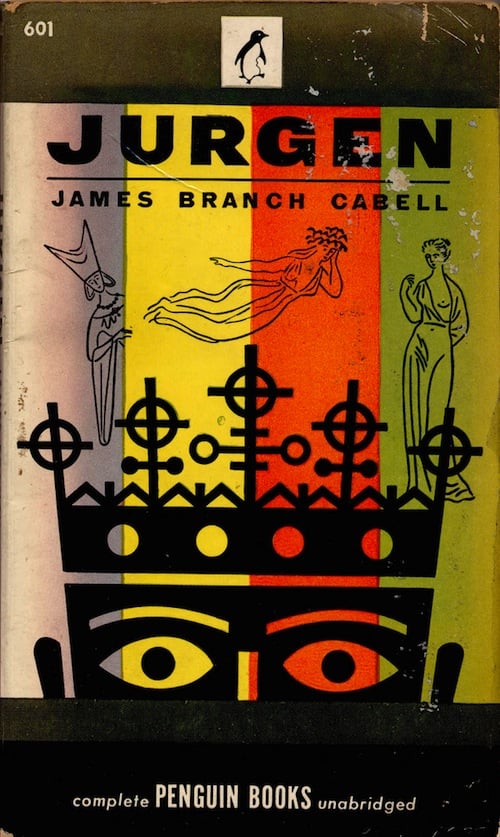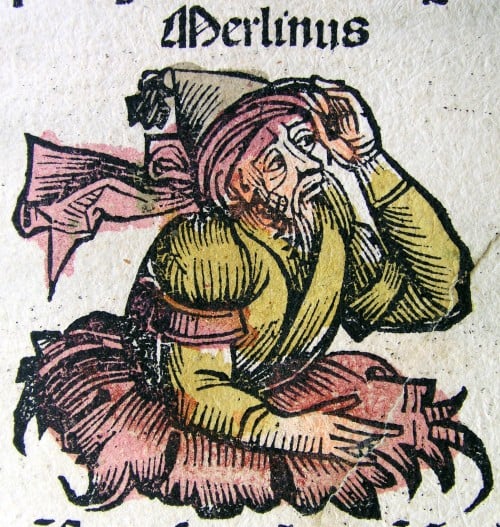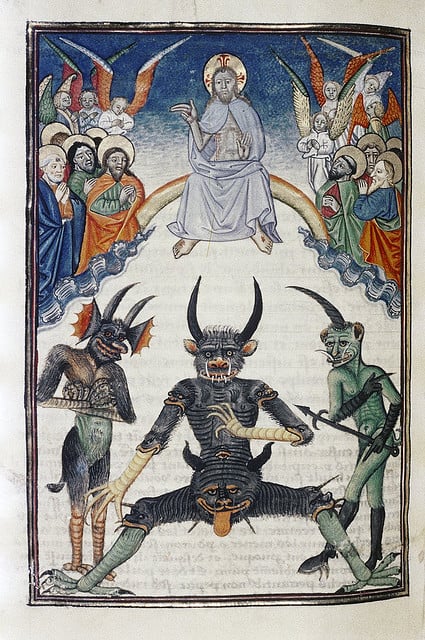Jurgen (19)
By:
July 20, 2015

James Branch Cabell’s 1919 ironic fantasy novel Jurgen, A Comedy of Justice, the protagonist of which seduces women everywhere he travels — including into Arthurian legend and Hell itself — is (according to Aleister Crowley) one of the “epoch-making masterpieces of philosophy.” Cabell’s sardonic inversion of romantic fantasy was postmodernist avant la lettre. HiLoBooks is pleased to serialize Jurgen here at HILOBROW. Enjoy!
It was two days later that Jurgen was sent for by Merlin Ambrosius. The Duke of Logreus came to the magician in twilight, for the windows of this room were covered with sheets which shut out the full radiance of day. Everything in the room was thus visible in a diffused and tempered light that cast no shadows. In his hand Merlin held a small mirror, about three inches square, from which he raised his dark eyes puzzlingly.
“I have been talking to my fellow ambassador, Dame Anaïtis: and I have been wondering, Messire de Logreus, if you have ever reared white pigeons.”
Jurgen looked at the little mirror. “There was a woman of the Léshy who not long ago showed me an employment to which one might put the blood of white pigeons. She too used such a mirror. I saw what followed, but I must tell you candidly that I understood nothing of the ins and outs of the affair.”

Merlin nodded. “I suspected something of the sort. So I elected to talk with you in a room wherein, as you perceive, there are no shadows.”
“Now, upon my word,” says Jurgen, “but here at last is somebody who can see my attendant! Why is it, pray, that no one else can do so?”
“It was my own shadow which drew my notice to your follower. For I, too, have had a shadow given me. It was the gift of my father, of whom you have probably heard.”
It was Jurgen’s turn to nod. Everybody knew who had begotten Merlin Ambrosius, and sensible persons preferred not to talk of the matter.
Then Merlin went on to speak of the traffic between Merlin and Merlin’s shadow.
“Thus and thus,” says Merlin, “I humor my shadow. And thus and thus my shadow serves me. There is give-and-take, such as is requisite everywhere.”
“I understand,” says Jurgen: “but has no other person ever perceived this shadow of yours?”
“Once only, when for a while my shadow deserted me,” Merlin replied. “It was on a Sunday my shadow left me, so that I walked unattended in naked sunlight: for my shadow was embracing the church-steeple, where church-goers knelt beneath him. The church-goers were obscurely troubled without suspecting why, for they looked only at each other. The priest and I alone saw him quite clearly, — the priest because this thing was evil, and I because this thing was mine.”
“Well, now I wonder what did the priest say to your bold shadow?”
“‘But you must go away!’ — and the priest spoke without any fear. Why is it they seem always without fear, those dull and calm-eyed priests? ‘Such conduct is unseemly. For this is High God’s house, and far-off peoples are admonished by its steadfast spire, pointing always heavenward, that the place is holy,’ said the priest. And my shadow answered, ‘But I only know that steeples are of phallic origin.’ And my shadow wept, wept ludicrously, clinging to the steeple where church-goers knelt beneath him.”

“Now, and indeed that must have been disconcerting, Messire Merlin. Still, as you got your shadow back again, there was no great harm done. But why is it that such attendants follow some men while other men are permitted to live in decent solitude? It does not seem quite fair.”
“Perhaps I could explain it to you, friend, but certainly I shall not. You know too much as it is. For you appear in that bright garment of yours to have come from a land and a time which even I, who am a skilled magician, can only cloudily foresee, and cannot understand at all. What puzzles me, however” — and Merlin’s fore-finger shot out. “How many feet had the first wearer of your shirt? and were you ever an old man?” says he.
“Well, four, and I was getting on,” says Jurgen.
“And I did not guess! But certainly that is it, — an old poet loaned at once a young man’s body and the Centaur’s shirt. Adères has loosed a new jest into the world, for her own reasons —”
“But you have things backwards. It was Sereda whom I cajoled so nicely.”
“Names that are given by men amount to very little in a case like this. The shadow which follows you I recognize — and revere — as the gift of Adères, a dreadful Mother of small Gods. No doubt she has a host of other names. And you cajoled her, you consider! I would not willingly walk in the shirt of any person who considers that. But she will enlighten you, my friend, at her appointed time.”
“Well, so that she deals justly —” Jurgen said, and shrugged.
Now Merlin put aside the mirror. “Meanwhile it was another matter entirely that Dame Anaïtis and I discussed, and about which I wished to be speaking with you. Gogyrvan is sending to King Arthur, along with Gogyrvan’s daughter, that Round Table which Uther Pendragon gave Gogyrvan, and a hundred knights to fill the sieges of this table. Gogyrvan, who, with due respect, possesses a deplorable sense of humor, has numbered you among these knights. Now it is rumored the Princess is given to conversing a great deal with you in private, and Arthur has never approved of garrulity. So I warn you that for you to come with us to London would not be convenient.”
“I hardly think so, either,” said Jurgen, with appropriate melancholy; “for me to pursue the affair any further would only result in marring what otherwise will always be a perfect memory of divers very pleasant conversations.”
“Old poet, you are well advised,” said Merlin, — “especially now that the little princess whom we know is about to enter queenhood and become a symbol. I am sorry for her, for she will be worshipped as a revelation of Heaven’s splendor, and being flesh and blood, she will not like it. And it is to no effect I have forewarned King Arthur, for that must happen which will always happen so long as wisdom is impotent against human stupidity. So wisdom can but make the best of it, and be content to face the facts of a great mystery.”
Thereupon, Merlin arose, and lifted the tapestry behind him, so that Jurgen could see what hitherto this tapestry had screened.
“You have embarrassed me horribly,” said Jurgen, “and I can feel that I am still blushing, about the ankles. Well, I was wrong: so let us say no more concerning it.”
“I wished to show you,” Merlin returned, “that I know what I am talking about. However, my present purpose is to put Guenevere out of your head: for in your heart I think she never was, old poet, who go so modestly in the Centaur’s shirt. Come, tell me now! and does the thought of her approaching marriage really disturb you?”
“I am the unhappiest man that breathes,” said Jurgen, with unction. “All night I lie awake in my tumbled bed, and think of the miserable day which is past, and of what is to happen in that equally miserable day whose dawn I watch with a sick heart. And I cry aloud, in the immortal words of Apollonius Myronides —”
“Of whom?” says Merlin.
“I allude to the author of the Myrosis,” Jurgen explained, — “whom so many persons rashly identify with Apollonius Herophileius.”
“Oh, yes, of course! your quotation is very apt. Why, then your condition is sad but not incurable. For I am about to give you this token, with which, if you are bold enough, you will do thus and thus.”
“But indeed this is a somewhat strange token, and the arms and legs, and even the head, of this little man are remarkably alike! Well, and you tell me thus and thus. But how does it happen, Messire Merlin, that you have never used this token in the fashion you suggest to me?”
“Because I was afraid. You forget I am only a magician, whose conjuring raises nothing more formidable than devils. But this is a bit of the Old Magic that is no longer understood, and I prefer not to meddle with it. You, to the contrary, are a poet, and the Old Magic was always favorable to poets.”
“Well, I will think about it,” says Jurgen, “if this will really put Dame Guenevere out of my head.”
“Be assured it will do that,” said Merlin. “For with reason does the Dirghâgama declare, ‘The brightness of the glowworm cannot be compared to that of a lamp.’”
“A very pleasant little work, the Dirghâgama,” said Jurgen, tolerantly — “though superficial, of course.”
Then Merlin Ambrosius gave Jurgen the token, and some advice.
So that night Jurgen told Guenevere he would not go in her train to London. He told her candidly that Merlin was suspicious of their intercourse.
“And therefore, in order to protect you and to protect your fame, my dearest dear,” said Jurgen, “it is necessary that I sacrifice myself and everything I prize in life. I shall suffer very much: but my consolation will be that I have dealt fairly with you whom I love with an entire heart, and shall have preserved you through my misery.”

But Guenevere did not appear to notice how noble this was of Jurgen. Instead, she wept very softly, in a heartbroken way that Jurgen found unbearable.
“For no man, whether emperor or peasant,” says the Princess, “has ever been loved more dearly or faithfully or more wholly without any reserve or forethought than you, my dearest, have been loved by me. All that I had I have given you. All that I had you have taken, consuming it. So now you leave me with not anything more to give you, not even any anger or contempt, now that you turn me adrift, for there is nothing in me anywhere save love of you, who are unworthy.”
“But I die many deaths,” said Jurgen, “when you speak thus to me.” And in point of fact, he did feel rather uncomfortable.
“I speak the truth, though. You have had all: and so you are a little weary, and perhaps a little afraid of what may happen if you do not break off with me.”
“Now you misjudge me, darling —”
“No, I do not misjudge you, Jurgen. Instead, for the first time I judge both of us. You I forgive, because I love you, but myself I do not forgive, and I cannot ever forgive, for having been a spendthrift fool.”
And Jurgen found such talking uncomfortable and tedious and very unfair to him. “For there is nothing I can do to help matters,” says Jurgen. “Why, what could anybody possibly expect me to do about it? And so why not be happy while we may? It is not as though we had any time to waste.”
For this was the last night but one before the day that was set for Guenevere’s departure.
Footnotes from Notes on Jurgen (1928), by James P. Cover — with additional comments from the creators of this website; rewritten, in some instances, by HiLoBooks.
* Mirror and white pigeons — See, in this connection, Book Second, Chapter VII, and Book Third, Chapter III, of The Cream of the Jest. Cabell fully elucidates the mystery behind the imagery of the mirror and pigeons in Special Delivery: A Packet of Replies, ch. 8, “Mirror and Pigeons”.
* My father — You will recall that “Merlin’s father” was reputed to be Satan.
* Adéres — “But you have things backwards. It was Sereda…” Adéres is Sereda spelled backwards.
* The Round Table — Leodegrance gave the Round Table, along with a hundred knights to fill its seats, to Arthur as a dowry for Guenevere. It had originally been the property of Uther Pendragon, and seated a hundred and fifty knights.
* Uther Pendragon — Uther Pendragon was the king of all England, and the father of Arthur.
* Apollonius Myronides — This was a physician who lived in the first century B.C. He is often identified with Apollonius Herophileius.
* Myrosis — This book, attributed to Apollonius by Pliny, is thought to be a treatise on unguents.
* Apollonius Herophileius — This Apollonius was a physician, and the author of a pharmaceutical work. He probably lived in or before the first century B.C.
* The Dirghâgama is a Buddhist holy book.
RADIUM AGE SCIENCE FICTION: “Radium Age” is HILOBROW’s name for the 1904–33 era, which saw the discovery of radioactivity, the revelation that matter itself is constantly in movement — a fitting metaphor for the first decades of the 20th century, during which old scientific, religious, political, and social certainties were shattered. This era also saw the publication of genre-shattering writing by Edgar Rice Burroughs, Sax Rohmer, E.E. “Doc” Smith, Jack London, Arthur Conan Doyle, Aldous Huxley, Olaf Stapledon, Karel Čapek, H.P. Lovecraft, Charlotte Perkins Gilman, Yevgeny Zamyatin, Philip Gordon Wylie, and other pioneers of post-Verne/Wells, pre-Golden Age “science fiction.” More info here.
READ GORGEOUS PAPERBACKS: HiLoBooks has reissued the following 10 obscure but amazing Radium Age science fiction novels in beautiful print editions: Jack London’s The Scarlet Plague, Rudyard Kipling’s With the Night Mail (and “As Easy as A.B.C.”), Arthur Conan Doyle’s The Poison Belt, H. Rider Haggard’s When the World Shook, Edward Shanks’ The People of the Ruins, William Hope Hodgson’s The Night Land, J.D. Beresford’s Goslings, E.V. Odle’s The Clockwork Man, Cicely Hamilton’s Theodore Savage, and Muriel Jaeger’s The Man with Six Senses. For more information, visit the HiLoBooks homepage.
SERIALIZED BY HILOBOOKS: Jack London’s The Scarlet Plague | Rudyard Kipling’s With the Night Mail (and “As Easy as A.B.C.”) | Arthur Conan Doyle’s The Poison Belt | H. Rider Haggard’s When the World Shook | Edward Shanks’ The People of the Ruins | William Hope Hodgson’s The Night Land | J.D. Beresford’s Goslings | E.V. Odle’s The Clockwork Man | Cicely Hamilton’s Theodore Savage | Muriel Jaeger’s The Man With Six Senses | Jack London’s “The Red One” | Philip Francis Nowlan’s Armageddon 2419 A.D. | Homer Eon Flint’s The Devolutionist | W.E.B. DuBois’s “The Comet” | Edgar Rice Burroughs’s The Moon Men | Charlotte Perkins Gilman’s Herland | Sax Rohmer’s “The Zayat Kiss” | Eimar O’Duffy’s King Goshawk and the Birds | Frances Hodgson Burnett’s The Lost Prince | Morley Roberts’s The Fugitives | Helen MacInnes’s The Unconquerable | Geoffrey Household’s Watcher in the Shadows | William Haggard’s The High Wire | Hammond Innes’s Air Bridge | James Branch Cabell’s Jurgen | John Buchan’s “No Man’s Land” | John Russell’s “The Fourth Man” | E.M. Forster’s “The Machine Stops” | John Buchan’s Huntingtower | Arthur Conan Doyle’s When the World Screamed | Victor Bridges’ A Rogue By Compulsion | Jack London’s The Iron Heel | H. De Vere Stacpoole’s The Man Who Lost Himself | P.G. Wodehouse’s Leave It to Psmith | Richard Connell’s “The Most Dangerous Game” | Houdini and Lovecraft’s “Imprisoned with the Pharaohs” | Arthur Conan Doyle’s “The Sussex Vampire.”
ORIGINAL FICTION: HILOBROW has serialized three novels: James Parker’s The Ballad of Cocky The Fox (“a proof-of-concept that serialization can work on the Internet” — The Atlantic); Karinne Keithley Syers’s Linda Linda Linda (which includes original music); and Robert Waldron’s roman à clef The School on the Fens. We also publish original stories and comics. These include: Matthew Battles’s stories “Gita Nova“, “Makes the Man,” “Imago,” “Camera Lucida,” “A Simple Message”, “Children of the Volcano”, “The Gnomon”, “Billable Memories”, “For Provisional Description of Superficial Features”, “The Dogs in the Trees”, “The Sovereignties of Invention”, and “Survivor: The Island of Dr. Moreau”; several of these later appeared in the collection The Sovereignties of Invention | Peggy Nelson’s “Mood Indigo“, “Top Kill Fail“, and “Mercerism” | Annalee Newitz’s “The Great Oxygen Race” | Flourish Klink’s Star Trek fanfic “Conference Comms” | Charlie Mitchell’s “A Fantasy Land” | Charlie Mitchell’s “Sentinels” | Joshua Glenn’s “The Lawless One”, and the mashup story “Zarathustra vs. Swamp Thing” | Adam McGovern and Paolo Leandri’s Idoru Jones comics | John Holbo’s “Sugarplum Squeampunk” | “Another Corporate Death” (1) and “Another Corporate Death” (2) by Mike Fleisch | Kathryn Kuitenbrouwer and Frank Fiorentino’s graphic novel “The Song of Otto” (excerpt) | John Holbo’s graphic novel On Beyond Zarathustra (excerpt) | “Manoj” and “Josh” by Vijay Balakrishnan | “Verge” by Chris Rossi, and his audio novel Low Priority Hero | EPIC WINS: THE ILIAD (1.408-415) by Flourish Klink | EPIC WINS: THE KALEVALA (3.1-278) by James Parker | EPIC WINS: THE ARGONAUTICA (2.815-834) by Joshua Glenn | EPIC WINS: THE MYTH OF THE ELK by Matthew Battles | TROUBLED SUPERHUMAN CONTEST: Charles Pappas, “The Law” | CATASTROPHE CONTEST: Timothy Raymond, “Hem and the Flood” | TELEPATHY CONTEST: Rachel Ellis Adams, “Fatima, Can You Hear Me?” | OIL SPILL CONTEST: A.E. Smith, “Sound Thinking | LITTLE NEMO CAPTION CONTEST: Joe Lyons, “Necronomicon” | SPOOKY-KOOKY CONTEST: Tucker Cummings, “Well Marbled” | INVENT-A-HERO CONTEST: TG Gibbon, “The Firefly” | FANFICTION CONTEST: Lyette Mercier’s “Sex and the Single Superhero”
